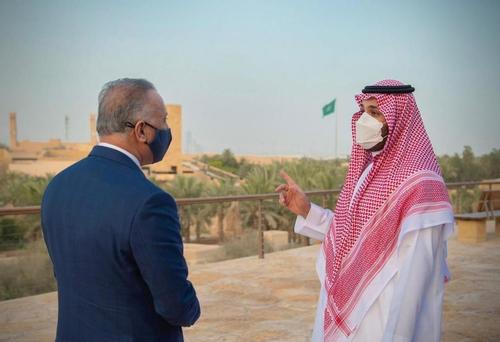Two Longtime Enemy Mideast Countries Have Entered Unlikely Peace Talks
Two longtime bitter enemies who have for much of the past couple decades battled for influence in the Middle East while clashing through proxies have entered unlikely secret talks. On Friday a Saudi foreign ministry official confirmed previously widespread rumors of the past weeks that the kingdom is in communications with Iran in order to reduce regional tensions. Earlier reports suggested the talks secretly took place in Baghdad.
“We hope they prove successful, but it is too early, and premature, to reach any definitive conclusions,” Saudi ministry Ambassador Rayed Krimly told Reuters. He said that Riyadh needs to see “verifiable deeds” before evaluating the talks, with Bloomberg noting that Iraqi officials are mediating, with a focus on de-escalating the situation in Yemen – where Riyadh and Tehran are supporting rival sides of the civil war.

Iran’s foreign ministry responded by saying “bilateral co-operation is important in ensuring security and stability in the region.” Late last month the two sides had denied the talks, despite the persistent rumors.
As the Abu Dhabi-based The National recounts, Saudi crown prince MBS for the first time spoke of openness to talks with the Islamic Republic recently:
Last month Saudi Arabia’s Crown Prince Mohammed bin Salman said the kingdom was open to improving relations with Iran.
“Iran is a neighboring state. We are seeking to have good relations with Iran,” Prince Mohammed said.
“We have interests in Iran, we aim to see a prosperous Iran,” he said in a television interview.
“We are working with our partners in the region to overcome our differences with Iran, especially with its support for militias and the development of its nuclear program.”
Syria and Lebanon have also been key battlegrounds for the Shia and Sunni divide, with Shia Iran being Hezbollah’s biggest international backer. The Saudis have long directly armed, trained, and funded Sunni jihadists seeking to topple Assad in Syria while also rolling back Hezbollah’s influence.
This latest revelation and confirmation of Saudi-Iran talks also comes as the Saudis are reaching out the the Assad government in Damascus. Earlier this week on Tuesday multiple international reports revealed that Saudi Arabia’s powerful intelligence chief traveled to Damascus Monday to meet with his Syrian counterpart in what’s being seen as a major step toward detente. The two broke off relations since near the start of the war in 2011, especially as it became clear the Saudis were a key part of the Western allied push for regime change.
A Saudi foreign ministry official confirmed his country is in talks with Iran to reduce tensions in the Middle East, bringing weeks of private diplomacy between the two regional powerhouses into the open https://t.co/vzhRVxy4pC
— Bloomberg (@business) May 7, 2021
The US and Western alliance has long supported in the Saudi Sunni side of the ‘long war’ for the Middle East. This is particularly after the Shia ascendancy in Baghdad which was the direct result of Bush’s war to topple Saddam Hussein in 2003 (a Sunni secular dictator).
It’s very likely this is directly related to the ongoing Vienna nuclear negotiations involving signatories to the 2015 JCPOA deal, and most notably the ‘indirect’ talks between Tehran and Washington there. A crucial component to any lasting peace in the region would have to involve the Iranians and Saudis agreeing to halt their military support for rival proxies in the region.
However, for Iran its support of groups like Hezbollah, Hamas, and Iraqi Shia militias is mostly geared against Israel as well as US interests. So it’s unlikely Tehran will ever stop such support to any significant degree. At the same time the Saudi Wahhabi interpretation of Islam is deeply embedded within the kingdom’s religious and state establishment, making it a key source of continued ideological support to Sunni jihadism and terrorism globally.
Tyler Durden
Sun, 05/09/2021 – 10:10
via ZeroHedge News https://ift.tt/3xYmCGw Tyler Durden